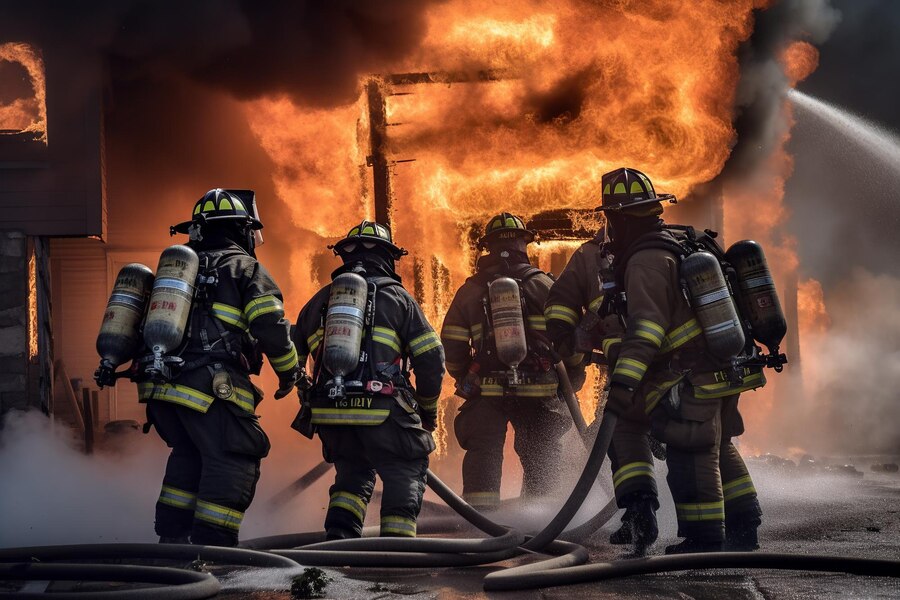Fire prevention is critical to maintaining a safe and secure home environment. Understanding the potential risks and implementing effective safety measures can significantly reduce the chances of a fire breaking out in your home. In this blog, we’ll explore practical tips and strategies to help you protect your loved ones and property from the devastating effects of fire. Let’s dive into these essential fire prevention tips.
Understanding Fire Risks in the Home
Understanding home fire risks is the first step toward effective fire prevention. Common causes of house fires include cooking accidents, electrical malfunctions, heating equipment, and unattended candles. Kitchens are particularly hazardous, with grease fires being a significant risk. Electrical issues, such as overloaded circuits and faulty wiring, can spark fires unexpectedly. Space heaters and fireplaces can ignite nearby materials if not correctly maintained.
Smoking indoors and leaving candles unattended are dangerous practices that can lead to accidental fires. Recognizing these risks allows you to take proactive measures to mitigate them, ensuring a safer living environment for you and your family. Identifying and addressing these potential hazards is crucial for comprehensive fire prevention.
Install and Maintain Smoke Detectors
Smoke detectors are a crucial component of home fire prevention. Proper installation and regular maintenance can be life-saving. Place smoke detectors on every level of your home, especially near sleeping areas and the kitchen. As smoke rises, ensure detectors are installed on the ceiling or high on walls.
Press the test button regularly to test smoke detectors, ideally once a month. Replace batteries at least once a year or whenever you hear a low-battery chirp. Replacing the entire smoke detector unit every ten years is essential, as they can lose effectiveness over time.
Consider interconnected smoke detectors, alerting the entire house if one unit detects smoke. This system enhances early warning, providing more time to evacuate safely.
Develop a Fire Escape Plan
Creating a fire escape plan is essential for ensuring everyone’s safety during a fire. Here are some steps to develop an effective plan:
- Map Out Your Home: Draw a floor plan of your home, marking all doors and windows. Identify at least two escape routes from each room.
- Designate a Meeting Spot: Choose a safe location outside, far enough from the house, where everyone can gather after escaping. This helps ensure everyone is accounted for.
- Install Escape Ladders: For multi-story homes, equip upper-level rooms with escape ladders and ensure everyone knows how to use them.
- Practice Regularly: Conduct fire drills at least twice a year. Practice different scenarios, including nighttime drills, to ensure everyone can escape quickly and safely.
- Teach Fire Safety: Educate all household members, especially children, on how to stay low to avoid smoke inhalation, check doors for heat before opening, and use the escape routes effectively.
Proper Use and Storage of Flammable Materials
Proper use and storage of flammable materials are critical for preventing fires in your home. Here are some essential tips to ensure safety:
- Store in Appropriate Containers: Properly store flammable liquids like gasoline, paint thinners, and clean solvents in original or approved safety containers, ensuring tight sealing to prevent leaks and fumes.
- Keep Away from Heat Sources: Store flammable materials away from heat sources, such as stoves, heaters, and direct sunlight. An excellent, dry, and well-ventilated area is ideal for storage.
- Use with Caution: Follow the manufacturer’s instructions carefully when using flammable materials. Use them in well-ventilated areas to avoid the buildup of fumes, which can ignite.
- Dispose of Properly: Dispose of flammable materials according to local regulations. Never pour them down drains or throw them in regular trash. Many communities have designated disposal sites for hazardous materials.
- Limit Quantities: Only purchase and store the flammable material you need. Excess quantities increase the risk of fire and make storage more challenging.
Kitchen Safety Practices
The kitchen is one of the most common areas where house fires start. Implementing safe practices can significantly reduce the risk of kitchen fires. Here are five essential kitchen safety tips:
- Never Leave Cooking Unattended: Stay in the kitchen while cooking, especially when using high heat. If you need to leave, turn off the stove or use a timer to remind you to check on your food.
- Keep Flammable Items Away: Ensure that flammable items, such as dish towels, paper towels, and oven mitts, are kept away from the stovetop and other heat sources. Maintain a clutter-free cooking area.
- Use Appliances Safely: Inspect kitchen appliances for frayed cords or other damage. Unplug small appliances when not in use and follow the manufacturer’s instructions for safe operation.
- Have a Fire Extinguisher Handy: Keep a fire extinguisher within easy reach in the kitchen. Ensure you know how to use it and that it is regularly inspected and maintained.
- Handle Grease with Care: Grease fires are common in kitchens, so use a grease-resistant fire extinguisher or baking soda instead of water to extinguish the flames.
Electrical Safety Tips
Electrical hazards are a leading cause of house fires, but you can minimize these risks with proper precautions. Here are essential electrical safety tips to help keep your home safe:
- Inspect and Replace Damaged Cords: Regularly check electrical cords for signs of wear and tear, such as fraying or cracking. Replace damaged cords immediately to prevent electrical fires.
- Avoid Overloading Outlets: Plugging too many devices into a single outlet can cause overheating and fires. Use power strips with built-in circuit breakers and ensure they are not overloaded.
- Unplug Unused Appliances: When not in use, unplug small appliances like toasters, coffee makers, and chargers. This reduces the risk of overheating and saves energy.
- Install Ground Fault Circuit Interrupters (GFCIs): GFCIs protect against electrical shock and should be installed in kitchens, bathrooms, and other areas with water exposure. Test them monthly to ensure they are functioning correctly.
- Hire a Licensed Electrician for Repairs: Always hire a licensed electrician for any electrical repairs or installations. DIY electrical work can be dangerous and increase the risk of fire.
Heating Equipment Safety
Heating equipment is essential for keeping your home warm but can also be a fire hazard if not used properly. Here are essential tips for safely using and maintaining heating equipment:
- Regular Maintenance: Have your heating equipment, such as furnaces, fireplaces, and space heaters, inspected and serviced by a professional annually. Regular maintenance ensures they operate safely and efficiently.
- Keep Flammable Items Away: Maintain a safe distance between heating equipment and flammable items like furniture, curtains, bedding, and clothing. A minimum clearance of three feet is recommended.
- Use Space Heaters Safely: Always place space heaters on a flat, stable surface, away from foot traffic. Ensure they have an automatic shut-off feature in case they tip over. Never leave space heaters unattended or run them overnight.
- Install and Use Chimney Caps: If you have a fireplace, ensure your chimney has a cap to prevent debris and animals from entering. Regularly clean and inspect the chimney to avoid creosote buildup, which can cause chimney fires.
- Follow Manufacturer’s Instructions: Carefully read and follow the manufacturer’s instructions for all heating equipment. This includes installation, usage, and maintenance guidelines to ensure safe operation.
Regular Home Maintenance Checks
Regular inspections of fire-prone areas in your home are crucial for preventing fires and ensuring the safety of your household. Key areas to focus on include the kitchen, where cooking accidents are standard and electrical systems, where faulty wiring can lead to fires. Inspect your heating equipment, such as furnaces and fireplaces, for any signs of malfunction or damage.
Check smoke detectors and replace batteries regularly to ensure they are functioning correctly. Look for potential hazards like overloaded power outlets and flammable materials stored improperly. By conducting these maintenance checks routinely, you can identify and address potential fire risks early, significantly reducing the likelihood of a fire and enhancing the overall safety of your home.
Educate Your Family on Fire Safety
Educating your family on fire safety is essential for preventing accidents and ensuring everyone knows how to respond in an emergency. Start by teaching all family members, including children, about the dangers of fire and the importance of fire prevention. Conduct regular fire drills to practice your escape plan, ensuring everyone knows at least two ways to exit each room.
Show children how to stop, drop, and roll if their clothes catch fire, and explain the importance of staying low to avoid smoke inhalation. Familiarize everyone with the sound of smoke alarms and what to do when they hear it. By prioritizing fire safety education, you can empower your family to act quickly and safely in case of a fire.
What to Do in Case of a Fire
Knowing what to do in case of a fire can save lives. Here are five crucial steps to follow if a fire breaks out in your home:
- Stay Calm and Act Quickly: Panic can delay your response. Stay calm and immediately put your escape plan into action.
- Alert Everyone: Shout “Fire!” to alert everyone in the house. Make sure everyone is awake and aware of the situation.
- Use Your Escape Routes: Follow the escape routes you’ve practiced. Use an alternate route if one route is blocked by smoke or fire.
- Stay Low and Avoid Smoke: Smoke rises, so avoid inhaling toxic fumes. Crawl if necessary to reach an exit.
- Call 911 from Outside: Once you’re safely outside, call 911. Do not go back inside for any reason. Inform the fire department if anyone is missing and their possible location.
Effective fire prevention strategies are essential for safeguarding your home and loved ones. You can significantly reduce the chances of a fire by understanding fire risks, maintaining smoke detectors, creating a fire escape plan, and educating your family on fire safety. Regular maintenance and safe practices in the kitchen, electrical systems, and heating equipment enhance your home’s safety.
For more fire prevention tips or assistance, contact IAFF Local 1563 at 410-987-1180. Stay vigilant, stay safe, and ensure your home is well-protected against fire hazards.

